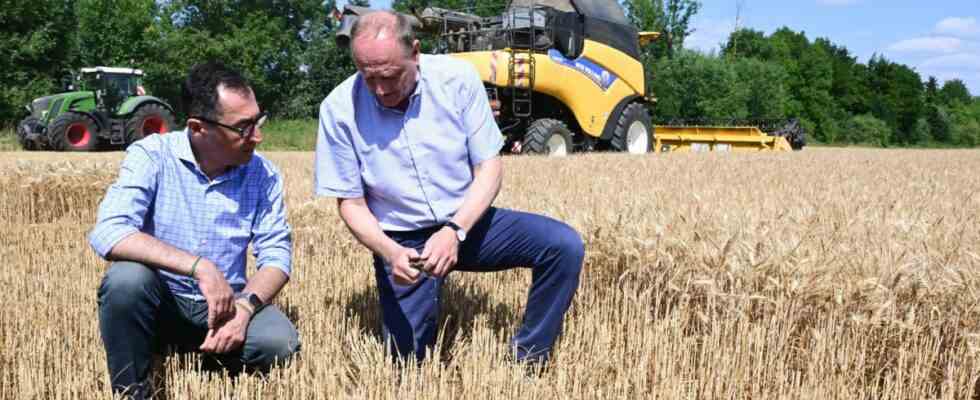In view of the strained international agricultural markets as a result of the Ukraine war, farmers in Germany can use more land for growing grain. To this end, the new EU regulations on set-aside and crop rotation are to be suspended once. This is a compromise proposed by Agriculture Minister Cem Özdemir.
The additional species protection areas actually planned are not to be introduced until 2024. Farmers could then continue to grow food on these areas in the coming year.
Species protection and the global food crisis
The background to this is EU regulations that will come into effect from 2023, according to which part of the agricultural land should serve to protect species – and also that the cultivation of the same crop two years in a row on the same area for soil protection is no longer possible.
However, Brussels has left the implementation of these requirements to the respective EU states. Özdemir has now submitted his proposal to the federal states for the implementation of the Commission’s decision, which envisages suspending crop rotation and set-aside. Agricultural cultivation should be possible, “albeit limited to the production of food in line with the objectives of the Commission proposal, and therefore to the crops of cereals (without maize), sunflowers and legumes (without soybeans),” it says.
However, this only applies to the areas that were not already designated as fallow arable land in 2021 and 2022: “The existing biodiversity areas will continue to be protected and can provide their services for nature and species protection as well as sustainable agriculture.” In addition, according to the information provided, the EU has followed Özdemir’s suggestion and is allowing an exception when changing crop rotations. The corresponding regulation will be suspended once in 2023. This would allow farmers in Germany to plant wheat after wheat on an exceptional basis on around 380,000 hectares.
According to scientific calculations, up to 3.4 million tons of wheat could be grown in this way. This is the best way to “keep the grain yields in Germany stable and thus contribute to the stability of the world markets,” it said.
Like many other politicians, Özdemir has repeatedly emphasized that Russian President Vladimir Putin is playing with hunger in the context of the war of aggression against Ukraine, and he is doing this at the expense of the poorest in the world. At the same time, hunger is greatest where the climate crisis is already having serious consequences. “For me, therefore, every measure to solve a crisis must be checked to ensure that it does not exacerbate another,” said the Green politician.
“Overdue and Last Minute”
The President of the German Farmers’ Association, Joachim Rukwied, welcomed the proposal. “This decision was overdue and comes at the last minute,” he said. “We farmers have already started planning cultivation for the coming year and need planning security.” From Rukwied’s point of view, a suspension for one year is certainly not sufficient. In order to continue to ensure a secure food supply and to be able to react in times of crisis, all areas must be able to be used on which it makes agricultural sense. The federal states would now have to confirm this quickly.
Baden-Württemberg and the FDP also welcomed the compromise proposal. Özdemir has finally given in, said the Stuttgart Minister for Food, Rural Areas and Consumer Protection, Peter Hauk (CDU), who is also spokesman for the Union-led agricultural departments of the federal states. The deputy FDP parliamentary group leader in the Bundestag, Carina Konrad, made a similar statement. Now the regulations must be implemented quickly and with legal certainty, since the sowing is imminent. It is good that Özdemir has recognized how dramatic the global hunger crisis is and that farmers are being able to grow more grain.
Greenpeace expert Matthias Lambrecht, on the other hand, criticized the fact that the areas for protecting biodiversity in agriculture were being sacrificed to economic interests. “But food security in times of war is just a pretext for plowing under valuable biotopes,” he said. Wheat grown there would not be available until next year and in insufficient quantities to effectively counteract the acute global hunger crisis. By phasing out biofuel, on the other hand, a multiple of the amount of grain could immediately be made available for the fight against hunger.

